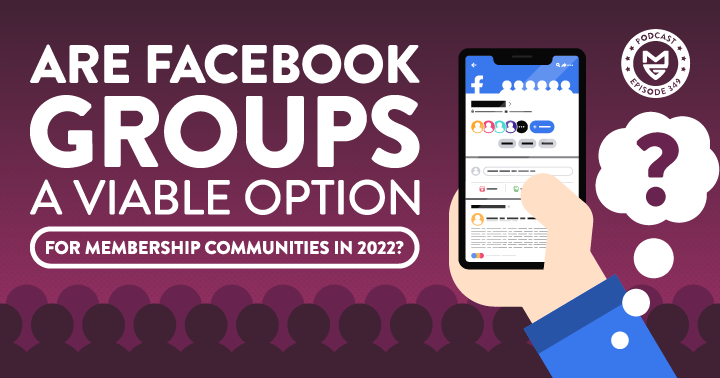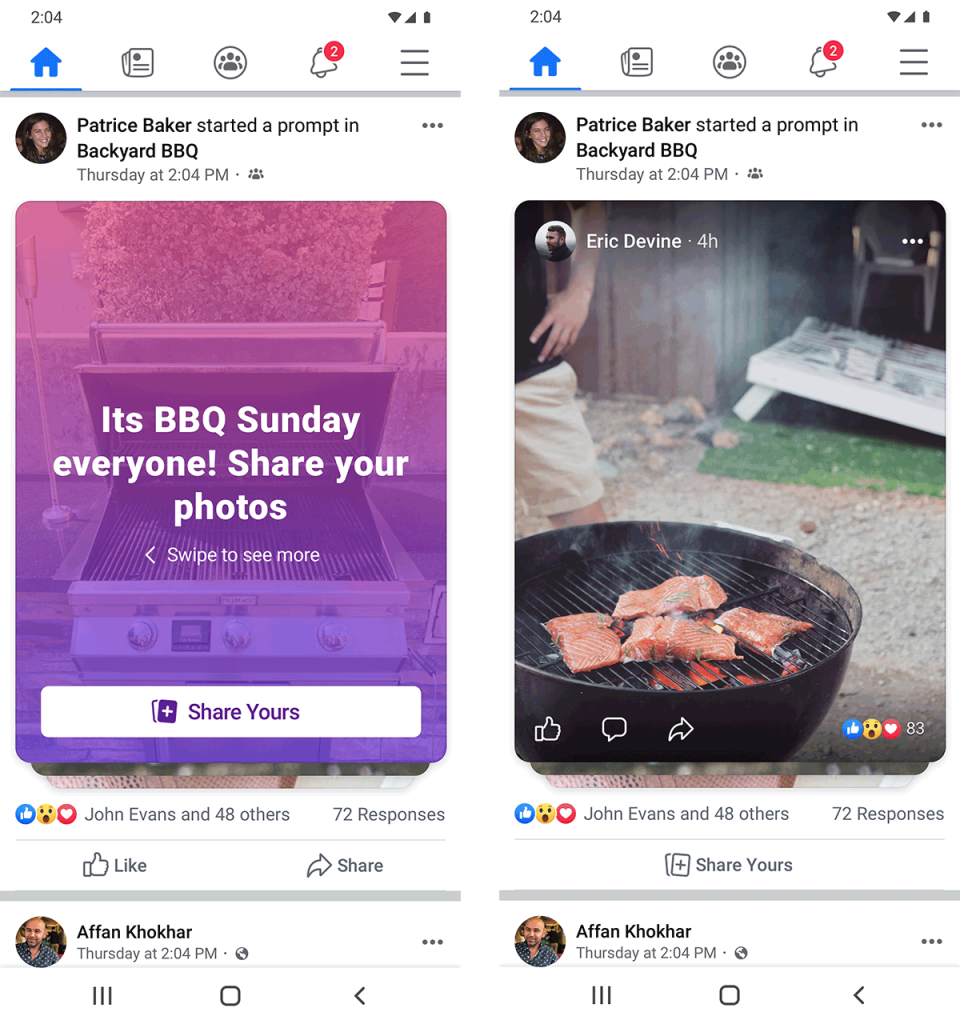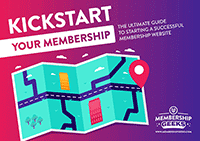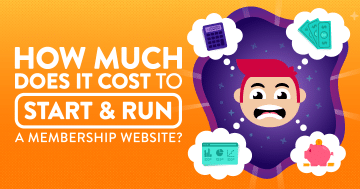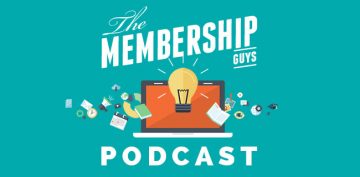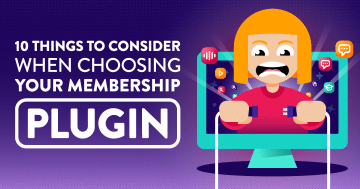Are Facebook groups a viable option for membership communities?
This is a debate that’s been raging in the membership space for quite some time!
The decision over where your paid community should live is still a big question for many membership owners…
But as is often the case when it comes to memberships, there isn't a ‘one size fits all' answer.
There are pros and cons to all options.
It’s not exactly news that I'm not a huge fan of using a private Facebook group for your membership community…
But, I'm not here to tell you that this option definitely isn’t right for your membership.
There’s a lot to be said from both sides of the argument…
And a lot of changes in recent years – both good and bad.
I'm here to give you the facts about both sides so you can make an informed decision based on the kind of membership you want to run.
So let's go through the pros and cons of using Facebook groups for your membership community…
The Pros:
There are a lot more pros for using Facebook groups for your community than there used to be.
They're definitely upping their game!
And here are some of them…
Accessibility
Facebook is easy, accessible and discoverable…
And for most people, this is the main selling point of using a Facebook group for their community.
Everyone and their grandparents are on Facebook, which makes it a great place to interact.
Using that logic, most of your members are probably already on Facebook!
This means you don’t really have to “build” much of a platform, because your members are already there.
New features
Facebook has really ramped up the group features over the past couple of years…
And some of them are really quite powerful for membership owners!
You can now use gamification in your groups, offering badges to members and assigning some as experts…
Imagine how useful this feature would be if you utilize guest experts in your membership?
Better organisation
In the past, one of my major complaints about Facebook groups was disorganisation.
Now, it’s not quite the epitome of “neat and tidy’ just yet, but Facebook is gradually balancing things out with the introduction of features like guides.
So, it’s easier for group admins to collate posts and gather content into static guides.
That alone makes Facebook more than just a place to chat; it’s a content distribution channel!
New ways to engage
It’s a social media network, so it’s no surprise that engagement is at the forefront of their goals.
Facebook has really levelled things up in terms of how people can engage within groups.
There are tons of interesting features such as different post formats, the ability to host rooms and announcements alongside standard things like polls, events, recommendations, and hashtags.
The great thing about these features isn’t just that they’re fun, they add more structure to your community, too…
And generate varied interactions that are well suited to the membership model.
Ease of organizing events
Running a membership often involves hosting live events, Q&As, or workshops.
Facebook is pretty handy on this front.
They’ve gone beyond just being able to broadcast live video within groups, you can also tee that up by adding an event to the group itself.
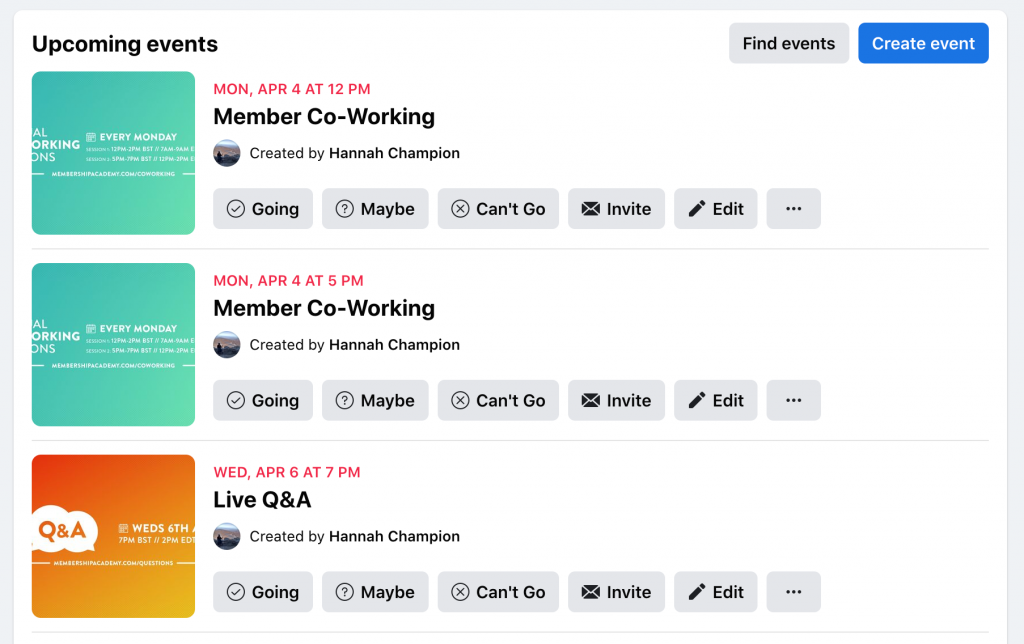
It’s a neat little setup that allows people to RSVP to events and have all the information they need available in advance.
Think of it as a mini event calendar within your group.
Group rules
In the past, there were very limited options for dealing with disruptive members...
The only way forward was to block anyone that ruffled a few feathers.
But this is another area that Facebook has upped its game…
Membership owners can now pre-approve posts, mute guests, switch off automatic posting, and do so much more.
Bottom line, there are loads of options for controlling how your community interacts.
This is just the tip of the iceberg when it comes to what Facebook groups offer.
The Cons:
There's another side to the coin though, and it isn’t as pretty…
Accessibility (yep, it's a bad thing too!)
This is one of those cases where a strength also turns out to be a huge weakness…
We’ve already established that accessibility is a major selling point of using a Facebook group for your community.
But there's also the flip side…
With everyone on Facebook, things can get a little distracting…
You aren’t just competing against other people’s groups. There are also their friends, newsfeeds, and even ads.
This makes it harder to navigate more serious content and detracts from the value of your membership.
That's why most membership communities that make it big on Facebook have more of an informal space for their members.
Navigating different locations
While hosting your community on Facebook does come with certain comforts, it’s also quite inconvenient for your members to go back and forth between your main membership website and the Facebook app.
You're asking your members to engage with you and your membership in two very different places.
The problem is that you can’t engage on two completely different platforms, without it having some sort of effect on your members’ mindsets.
After all, you're adding an extra hurdle for your members to actively participate in your community.
The aim should be to make it easier for your members to engage with you and each other.
No room for automation or integrations
What’s a membership community without a few add-ons here and there?
It’s a private Facebook group.
For the most part, Facebook is not keen on you adding tools, even the ones that make certain tasks easier.
So, you still have to go through the pains of manually approving members, importing their contacts to a spreadsheet, managing their details so you can remove them from the group if they cancel…
And just generally collating information manually.
That's not ideal for anyone.
Limited reach
This is a big one for membership owners because frequent and timely communication is vital within communities…
It’s highly inconvenient that in a group of 20,000, less than 10% of your members actually see your post.
So, there’s a chance they may not see important updates or have access to you when they need it most.
It doesn’t just end with you not being able to reach them, it's about them not being able to reach you, too…
That just reinforces the fact that you’re building on rented land…
And is a big reason why we're seeing more and more membership owners asking about the best way to move their community away from Facebook and onto a forum.
You have zero control over features and are at the whim of your landlord; Facebook.
So, are there any alternatives to Facebook?
Thankfully, we now have more options than just Facebook and on-site forums.
There are a handful of platforms that look and feel more social media-driven – Circle, Mighty Networks, and Podia to name but a few…
However, traditional on-site forums are still a massively viable option.
You can still have a Facebook group in the mix for people who are particular to Facebook…
Still struggling to make a decision?
It really depends on what's most important you…
If the pros we've listed above outweigh the cons for you, then go for it…
But if the cons of using a Facebook group for your community raise some red flags for you, then maybe it's not worth the risk.
For us personally, we wouldn't want to solely use Facebook as the hub of our membership community…
Yes the features they've added in recent years are awesome…
But with the decline in reach meaning fewer people see your posts, is it worth it?
That's up to you decide.
